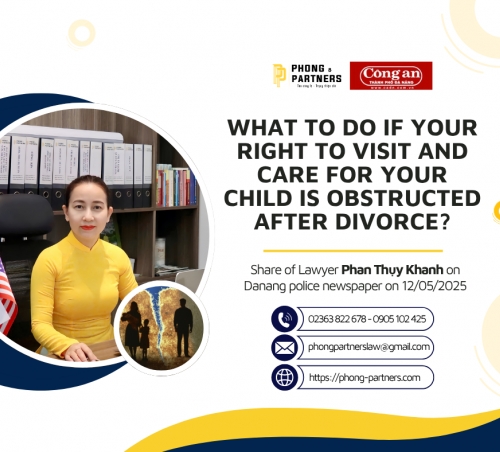*Lawyer Dang Van Vuong - Deputy Head of Phong & Partners Law Firm, replied:
Due to various reasons such as job opportunities, living conditions, or family reunification, many Vietnamese people have chosen to settle and work abroad. However, this does not negate their fundamental rights as regulated by Vietnamese law. The Vietnamese government continues to recognize and protect the rights of overseas Vietnamese, including their property ownership rights, inheritance rights, and other related rights.
1. Do siblings have the right to inherit?
Since your brother passed away without leaving a will, according to point a, Clause 1, Article 650 of the Civil Code 2015, your brother's inheritance will be distributed according to the law. Specifically, those entitled to inherit under the law are regulated in Article 651 of the Civil Code 2015 as follows:
"Article 651. Legal heirs
1. The heirs according to the law are determined in the following order:
a) The first line of heirs includes: spouse, biological father, biological mother, adoptive father, adoptive mother, biological children, adopted children of the deceased;
b) The second line of heirs includes: paternal grandfather, paternal grandmother, maternal grandfather, maternal grandmother, biological siblings of the deceased; biological grandchildren of the deceased where the deceased is their paternal grandfather, paternal grandmother, maternal grandfather, maternal grandmother;
c) The third line of heirs includes: paternal great-grandfather, paternal great-grandmother, maternal great-grandfather, maternal great-grandmother of the deceased; biological uncles, aunts, paternal and maternal cousins of the deceased; biological grand-nephews/nieces of the deceased where the deceased is their great-grandfather, great-grandmother.
2. Heirs of the same line shall receive equal portions of the estate.
3. Persons in the subsequent line of inheritance shall only inherit if there is no one left in the preceding line due to death, loss of inheritance rights, disinheritance, or refusal to accept the inheritance."
According to these regulations, those in the second line of inheritance are only entitled to inherit the estate if there are no heirs left in the first line due to death, loss of inheritance rights, disinheritance, or refusal to accept the inheritance. The third line of inheritance applies similarly. Thus, according to the law, siblings who belong to the second line of inheritance can only inherit if there are no heirs remaining in the first line of inheritance, such as the spouse, biological parents, adoptive parents, biological children, or adopted children of the deceased. In the case that someone in the first line of inheritance is still present, the siblings will not have the right to inherit the estate from their brother.
As per the information you provided, your older brother did not have a wife or children, and both of your parents have passed away. Therefore, you, Mrs. Nguyen Thi N, and Mrs. Nguyen Thi Th, being siblings, are in the second line of inheritance and thus have the right to inherit the estate from your brother.
.png)
2. Can Vietnamese people who have resided abroad for a long time receive inheritance?
According to Articles 609, 610, and 626 of the Civil Code 2015, the regulations are as follows:
"Article 609. Right to inheritance
An individual has the right to make a will to dispose of their property; to leave their property to legal heirs; to receive inheritance according to the will or the law.
Article 610. Equal rights to inheritance of individuals
All individuals are equal in the right to leave their property to others and the right to receive inheritance according to the will or the law."
These provisions demonstrate that Vietnamese law guarantees equality in inheritance rights. The law does not distinguish between domestic Vietnamese citizens, overseas Vietnamese, and foreigners in matters of legal inheritance. Therefore, even though Mr. M and Mrs. Th have lived abroad for many years, they still retain their right to inherit according to the law in Vietnam.
Additionally, Clause 1 Article 621 of Civil Code 2015 stipulates those who are not entitled to inherit, including:
- Persons convicted of intentionally infringing upon the life, health, or of seriously mistreating or tormenting the deceased; seriously violating the deceased's honor and dignity;
- Persons seriously violating the obligation to support the deceased;
- Persons convicted of intentionally infringing upon the life of another heir to enjoy part or all of the inheritance to which such heir is entitled;
- Persons having deceived, coerced, or prevented the deceased from making a will; forging, altering, destroying, or concealing the will to obtain part or all of the inheritance against the will of the deceased.
Thus, persons in these cases will be disqualified from inheritance. This is one of the measures to ensure fairness and ethics in the distribution of the estate and to prevent unethical or illegal acts.
Based on the information you have provided, we understand that you and Mrs. Th did not directly care for your brother, the deceased. However, according to the provisions of Article 621 of the Civil Code 2015, not directly caring for the deceased is not a basis for disqualification from inheritance rights. Therefore, you both are fully entitled to inherit unless there is evidence indicating that you have violated any provisions regarding inheritance rights.
3. Resolution methods
a. Priority for negotiation and reconciliation
Inheritance disputes often involve people with close family ties or marriage relations. Therefore, it is essential to prioritize negotiation and reconciliation to resolve disputes in a way that ensures the legitimate rights of siblings while preserving family harmony. You and your siblings can negotiate among yourselves or seek the assistance of a third party (a legal expert trusted by all three siblings, or a reputable lawyer) to explain the law and act as a mediator to enhance the likelihood of reaching a common agreement.
Once an agreement is reached, your siblings can proceed with the procedure for the Agreement on the Division of Inheritance at the Notary Office. After obtaining the notarized Agreement on the Division of Inheritance, you can bring it to the Bank to complete the procedures for receiving the inheritance concerning Mr.Binh’s savings account as per bank regulations.
b. Litigation option
If negotiation or reconciliation efforts fail, and you and your sister cannot reach an agreement regarding the division of inheritance according to the will, to protect your legitimate rights, you have the right to file a lawsuit at the competent People's Court to request the division of the inheritance according to the law regarding the assets left by your brother.















